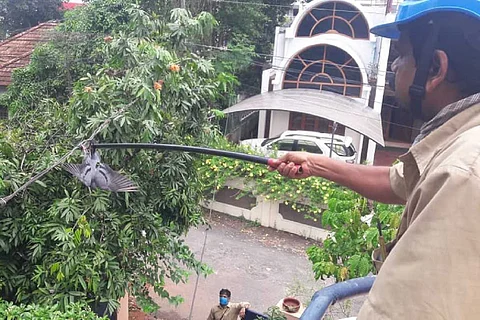

On the morning of May 13, Narayan’s family alerted him about a pigeon hanging upside down on an electric wire. It was trapped in the wire, tangled with something plastic wound around its leg. The wire was a line from the Kerala State Electricity Board (KSEB) in Thiruvananthapuram, coming to Narayan’s house in Kowdiar. The family realised that the pigeon was still alive and made desperate calls to the People for the Ethical Treatment of Animals (PETA). Narayan was advised to contact the KSEB since it was their line and only they could do something about it.
“When I called the KSEB, I was told that there was a shortage of staff and that all of them were out on duty, but that they’ll see what could be done. I thought it was just an excuse and that they wouldn't respond. But then in some time, two men came from the KSEB, and were genuinely concerned about the fate of the bird. They rescued it from the mess. The bird rested for a little while after we nursed it and then flew away, casting one last look in our direction. That felt really good,” Narayan says.
The KSEB, like other essential services, has been working without a break during all of the COVID-19 lockdown days in 12-hour shifts.
“During the lockdown time, they divided us into batches, and one batch would work on 12 hour shifts for four days in a row. We’d take all the precautions before going out to work, wearing masks and gloves and carrying hand sanitisers with us,” says Binoy, a lineman in Kozhikode.
Facebook post by KSEB Director Dr V Sivadasan on a lineman wearing mask as he works
They could not call the shots on where to go and where not to go. So, if there were complaints coming from the hotspot areas, they’d still need to attend them.
“The meter reader would be inside the house and even if the linemen wore gloves, they may need to remove it while handling the tools. They wouldn't know if any of the people in the house were in quarantine but they had to take that risk,” says Unnikrishnan, customer care executive at KSEB.
The Facebook page of KSEB has many stories of the brave deeds of the employees.
Unnikrishnan speaks of the time the second wave of COVID-19 began in the state with the arrival of a family in Ranni, Pathanamthitta, from Italy. Everyone in the family had tested positive and were under treatment at the government hospital.
“KSEB employees took the risk of going to the vacant house during this time to cut the electrical supply because otherwise, the electrical appliances in the house may get damaged in rain and lightning," says Unnikrishnan.
When a newly built women’s hostel in Alathur, Palakkad, was being converted into a COVID Care Centre, the electric connection was given an hour after the request came, making it possible for the centre to start functioning on May 8. “A team under Assistant Engineer S Anoop got the work done,” Unnikrishnan says.
Adding to the risks of the pandemic was the unexpected bout of summer rainfall.
“It makes things difficult. The employees, who would have been on the job for several hours and would have just been about to retire for the day, would need to attend a complaint if an electric line snapped somewhere. As part of the pre-monsoon preparation, we do a process called ‘touching’ in which we cut off palm leaves or branches that grow above electrical lines and are likely to fall on them if it rains heavily,” says Suresh Babu, an overseer at the Feroke Electrical Station.
Unnikrishnan notes that hundreds of electrical posts have fallen across the state, citing places like Kolanchery, Chadayamangalam, Kothamangalam and Attingal.
The pre-monsoon work began as early as November last year, says Mohanakumar, Deputy Chief Engineer, Distribution. “Normally, the comprehensive annual maintenance work begins in April-May. But since we expected more-than-usual summer showers, it was decided that the work should start earlier in a way that it will be over by February 15. However, with the sudden outbreak of COVID-19, all works got delayed,” he says.
With the lockdown, the KSEB took a call to provide uninterrupted power supply as far as possible since most people would be held at home and would need to work from home. “We restarted the maintenance work in April to finish the earlier work that we had started last November. We hope to get it done by May 20,” Mohanakumar says.
The work includes the ‘touching’ process mentioned by Suresh Babu, removing over-hangings, making sure that transmission equipment works properly, doing line patrolling to replace damaged ones, and so on.
Regarding exorbitant bills
During the lockdown, there have also been complaints of exorbitant electricity bills, which the KSEB has tried to address on its Facebook page.
Suresh Babu explains, “During the lockdown, maintenance work didn’t happen and (meter) readings were not taken down since no one could go out. So how we prepared the bills this time was by taking into account the last three healthy bills – this means the months when the consumers had been actively using power, and not those months when say, the house was locked down for a period. We would then calculate the average of these three healthy bills – which if bimonthly could go up to 6 months. Now we have resumed meter reading and for the next bill, the amount will be adjusted. But it is very likely that at the time of the lockdown, the power consumption would have been more than usual with all the family being at home, and this may have produced a more than average bill. In which case, the consumers may have to pay the excess amount with the next bill.”